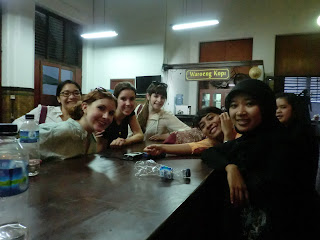USIPP #4: Democracy and Its Instruments
Our first
agenda today were visiting the Office of DKI Jakarta’s Governor. While waiting
for meeting time, we visited Museum National popularly known as Museum Gajah
which is located nearby the office. Though I have come to Jakarta many times,
that was my first time to visit this museum. The story behind the name of
Museum gajah is that, right in front of the building, they have an Elephant
(Gajah) statue. The bronze statue itself was a gift from Thailand’s King when
he was visited Indonesia in President Soekarno’s Era. We did not have much
time, thus we were only seeing the first and second floor of the main building.
The first floor consist of statue of Indonesia’s cultural figures made by stone
such as Hindu’s Gods, etc. In the upstair, they have a gold museum which is
relatively new.
 |
| Museum Nasional |
 After that, we went to the
Governor office where the Vice Governor of Tourism and Culture, Mr. Sukerti
Martono, greeted us. We had a nice lunch there and continued our visitation to
the Constitutional Court (Mahkamah Konstitusi). It was impressive. Judge Harjono basicly explained the authority of Constitusional Court
After that, we went to the
Governor office where the Vice Governor of Tourism and Culture, Mr. Sukerti
Martono, greeted us. We had a nice lunch there and continued our visitation to
the Constitutional Court (Mahkamah Konstitusi). It was impressive. Judge Harjono basicly explained the authority of Constitusional Court 1. Settle the dispute dealing with authority between state's body (Lembaga Negara).
2. Judicial Review.
3. Dealing with dissolution of political party.
4. Election issues.
5. Involving with impeachment of the President.
He also mentioned that Pancasila is a part of the Preambule and is not subject to be changed. It is the articles that are subject to be changed. Furthermore, he elaborated how the Constitutional Court keeps their body clean from corruption, bribery, and such. Here are some of the explanations:
1. They have 9 judges which 3 of them are appointed by the President, 3 more are appointed by Parliament (DPR), and the rest are appointed by the Supreme Court (Mahkamah Agung).
2. Most of the judges have academic background, which away from politics/ briberies.
3. When the Constitutional Court was built, there was no significant political power and that was a good environment to grow.
 |
| The View from the Constitutional Court |
 |
| Judge Harjono and Mr. Jun |
 |
| Fatima Hill |
 |
| Museum Bank Indonesia |
 |
| Dinner at Bandar Jakarta |
That was all for today. See ya on the next journey! ;)
Jakarta, June 7th, 2012






Comments
Post a Comment